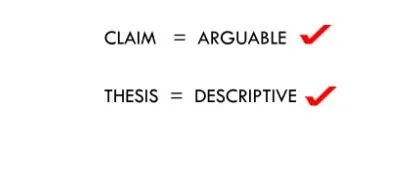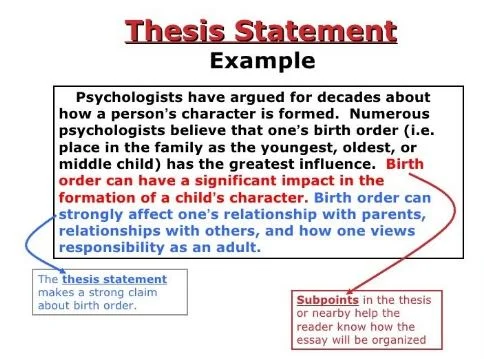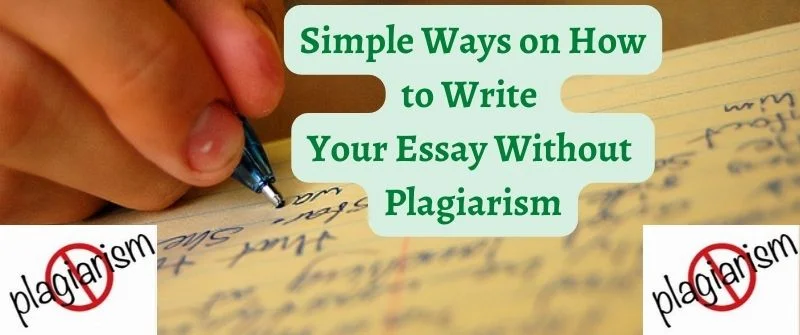- Have your assignments done by seasoned writers. 24/7. Contact us:
- +1 (213) 221-0069
- [email protected]


Is a Thesis the same as a Claim: How to Write Each

Comparing Thesis and a Claim
A thesis is a statement that carries the main idea of an essay, paper, or piece of writing to help the writer control the ideas within the paper. It reflects the main argument or point of the writer on a particular topic.
A claim is the beginning or end of an argument that needs to be supported with proper evidence and reasoning. This is because the audience to whom the claim is relayed can challenge it, and therefore, the argument made by the claim must stand.

Is a Thesis the same as a Claim?
Thesis statements are not necessarily claims, but they can be used as claims. For example, a thesis is the main argument in writing, while claims are the points that can be accrued from that statement.

Therefore, the thesis must be in the introductory part of ant piece of writing. Everything that you include in that writing must reflect back to the thesis statement. Backing the argument is what brings up a claim.
Therefore, claims are topic sentences that include the argument that backs the thesis.
They are a sneak peek of what you will include in your essay paragraphs and must be supported by factual information to bring out relevance.
However, a thesis statement can be a claim in argumentative papers . When you are arguing against something, you make a claim that you are supposed to back in the rest of the writing.
The statement is a claim because it should demonstrate the value, policy, facts, and examples that are recent, accurate, and reliable. Therefore, one can refer to a thesis statement as a main claim that sets up the way for other minor claims that support it.
These claims help build a well-rounded argument in the essay by showing that you have considered many possible positions to support your topic.
How to write a Thesis Statement
A thesis statement must be included in essays to provide the reader with a guide of your arguments and opinions in the essay and help you organize and develop your arguments.

A good thesis statement must be coherent, concise, and contentious. It should appear as the last part of the introduction of an essay or research paper.
There are four steps that one should follow when writing a thesis statement:
1. Start with a Question
To write a thesis statement, you need to come up with a question about what you want to find out about the topic you are writing about.
This question is like the initial thesis, which can be referred to as a working thesis because you are in the early stages of the writing process. The question should be based on what you want to say about the topic.
2. Write the Answer to the Question
After identifying the main question that should be asked about the topic, answer the question in detail. The answer to this question is what provides the root that your essay or research paper will follow.
Make the answer simple to ensure that you do not complicate your views. For example, if the question was on what are the effects of the internet on education, you can come up with an answer such as the internet has more negative effects on education today compared to its positive impacts.
3. Develop the Answer
After getting the answer, it is now time to consider why it effectively answers your essay question and how it will help you convince the reader that the arguments you will make in the essay are valid.
To do this, you need to research more so that when you begin to write, the answer will be provided and focused on extensively.
The answer you come up with should also effectively portray the position you have taken in the essay and sketch out the arguments that you will use to support it throughout the essay.
4. Refine the Thesis Statement
This is all about making sure that your thesis statement is strong enough.
Therefore, you must ensure that it tells the readers why you hold the position you have taken about the essay topic, what they will learn after going through your writing, and the key points of your argument or narrative that will be focused on in the essay.
A good thesis statement is not all about stating your position on the essay topic but also summarizing your overall argument on that particular topic. Considering this moves your thesis from weak to strong.
5. Make it Specific
The thesis statement should be straight to the point. Anything that will not be discussed in the essay should not be involved, and only specific evidence should be used to support it.
The language should also be specific. This means that the thesis statement should not report a statistic or a fact but make an assertion.
How to Write Claims

Claim statements in an essay or research paper must be arguable but should be stated as facts. This means that they should be debatable but at the same time show inquiry and evidence.
A claim cannot be a personal feeling or opinion about something. It must be something that is supportable using factual arguments. Therefore, a claim must be specific to assert a focused argument.
Also, claims define the goals, scope, and direction that your paragraphs will take. To write a good claim statement, you should:
Come up with a Strong Argument
A claim must be an argument that is in favor or against the topic of study. This argument should be supported by sufficient evidence to convince the reader that it is valid.
The Claim Should be Stated as a Fact
The claim must look as a fact to the reader. For example, the sentence ‘incarceration of juvenile delinquents is illegal’ is not a claim.
Instead, incarceration of juvenile delinquents is no longer an appropriate punishment in America’ is a factual claim.
The Claim Should be Straight to the Point
When a claim is direct, it shows you all the aspects that you will need to tackle. If it involves a lot of information, you are likely to make a vague argument that may not make sense or convince the reader.

James Lotta
Related posts.

Simple Ways on How to Write Your Essay Without Plagiarism
Writing Essay without Plagiarism: 9 ways to avoid plagiarism

what Respondus Records
Does Respondus Record you, Sound or Screen? Is it Safe?

writing Single-spaced Essay
Single Spaced Essay in Word: What it is, Meaning and Format

Want to create or adapt books like this? Learn more about how Pressbooks supports open publishing practices.
Identifying Thesis Statements, Claims, and Evidence
Thesis statements, claims, and evidence, introduction.
The three important parts of an argumentative essay are:
- A thesis statement is a sentence, usually in the first paragraph of an article, that expresses the article’s main point. It is not a fact; it’s a statement that you could disagree with. Therefore, the author has to convince you that the statement is correct.
- Claims are statements that support the thesis statement, but like the thesis statement, are not facts. Because a claim is not a fact, it requires supporting evidence.
- Evidence is factual information that shows a claim is true. Usually, writers have to conduct their own research to find evidence that supports their ideas. The evidence may include statistical (numerical) information, the opinions of experts, studies, personal experience, scholarly articles, or reports.
Each paragraph in the article is numbered at the beginning of the first sentence.
Paragraphs 1-7
Identifying the Thesis Statement. Paragraph 2 ends with this thesis statement: “People’s prior convictions should not be held against them in their pursuit of higher learning.” It is a thesis statement for three reasons:
- It is the article’s main argument.
- It is not a fact. Someone could think that peoples’ prior convictions should affect their access to higher education.
- It requires evidence to show that it is true.
Finding Claims. A claim is statement that supports a thesis statement. Like a thesis, it is not a fact so it needs to be supported by evidence.
You have already identified the article’s thesis statement: “People’s prior convictions should not be held against them in their pursuit of higher learning.”
Like the thesis, a claim be an idea that the author believes to be true, but others may not agree. For this reason, a claim needs support.
- Question 1. Can you find a claim in paragraph 3? Look for a statement that might be true, but needs to be supported by evidence.
Finding Evidence.
Paragraphs 5-7 offer one type of evidence to support the claim you identified in the last question. Reread paragraphs 5-7.
- Question 2. Which word best describes the kind of evidence included in those paragraphs: A report, a study, personal experience of the author, statistics, or the opinion of an expert?
Paragraphs 8-10
Finding Claims
Paragraph 8 makes two claims:
- “The United States needs to have more of this transformative power of education.”
- “The country [the United States] incarcerates more people and at a higher rate than any other nation in the world.”
Finding Evidence
Paragraphs 8 and 9 include these statistics as evidence:
- “The U.S. accounts for less than 5 percent of the world population but nearly 25 percent of the incarcerated population around the globe.”
- “Roughly 2.2 million people in the United States are essentially locked away in cages. About 1 in 5 of those people are locked up for drug offenses.”
Question 3. Does this evidence support claim 1 from paragraph 8 (about the transformative power of education) or claim 2 (about the U.S.’s high incarceration rate)?
Question 4. Which word best describes this kind of evidence: A report, a study, personal experience of the author, statistics, or the opinion of an expert?
Paragraphs 11-13
Remember that in paragraph 2, Andrisse writes that:
- “People’s prior convictions should not be held against them in their pursuit of higher learning.” (Thesis statement)
- “More must be done to remove the various barriers that exist between formerly incarcerated individuals such as myself and higher education.” (Claim)
Now, review paragraphs 11-13 (Early life of crime). In these paragraphs, Andrisse shares more of his personal story.
Question 5. Do you think his personal story is evidence for statement 1 above, statement 2, both, or neither one?
Question 6. Is yes, which one(s)?
Question 7. Do you think his personal story is good evidence? Does it persuade you to agree with him?
Paragraphs 14-16
Listed below are some claims that Andrisse makes in paragraph 14. Below each claim, please write the supporting evidence from paragraphs 15 and 16. If you can’t find any evidence, write “none.”
Claim: The more education a person has, the higher their income.
Claim: Similarly, the more education a person has, the less likely they are to return to prison.
Paragraphs 17-19
Evaluating Evidence
In these paragraphs, Andrisse returns to his personal story. He explains how his father’s illness inspired him to become a doctor and shares that he was accepted to only one of six biomedical graduate programs.
Do you think that this part of Andrisse’s story serves as evidence (support) for any claims that you’ve identified so far? Or does it support his general thesis that “people’s prior convictions should not be held against them in pursuit of higher learning?” Please explain your answer.
Paragraphs 20-23
Andrisse uses his personal experience to repeat a claim he makes in paragraph 3, that “more must be done to remove the various barriers that exist between formerly incarcerated individuals such as myself and higher education.”
To support this statement, he has to show that barriers exist. One barrier he identifies is the cost of college. He then explains the advantages of offering Pell grants to incarcerated people.
What evidence in paragraphs 21-23 support his claim about the success of Pell grants?
Paragraphs 24-28 (Remove questions about drug crimes from federal aid forms)
In this section, Andrisse argues that federal aid forms should not ask students about prior drug convictions. To support that claim, he includes a statistic about students who had to answer a similar question on their college application.
What statistic does he include?
In paragraph 25, he assumes that if a question about drug convictions discourages students from applying to college, it will probably also discourage them from applying for federal aid.
What do you think about this assumption? Do you think it’s reasonable or do you think Andrisse needs stronger evidence to show that federal aid forms should not ask students about prior drug convictions?
Supporting English Language Learners in First-Year College Composition Copyright © by Breana Bayraktar is licensed under a Creative Commons Attribution-NonCommercial-ShareAlike 4.0 International License , except where otherwise noted.
Share This Book
Purdue Online Writing Lab College of Liberal Arts
Developing Strong Thesis Statements


Welcome to the Purdue OWL
This page is brought to you by the OWL at Purdue University. When printing this page, you must include the entire legal notice.
Copyright ©1995-2018 by The Writing Lab & The OWL at Purdue and Purdue University. All rights reserved. This material may not be published, reproduced, broadcast, rewritten, or redistributed without permission. Use of this site constitutes acceptance of our terms and conditions of fair use.
The thesis statement or main claim must be debatable
An argumentative or persuasive piece of writing must begin with a debatable thesis or claim. In other words, the thesis must be something that people could reasonably have differing opinions on. If your thesis is something that is generally agreed upon or accepted as fact then there is no reason to try to persuade people.
Example of a non-debatable thesis statement:
This thesis statement is not debatable. First, the word pollution implies that something is bad or negative in some way. Furthermore, all studies agree that pollution is a problem; they simply disagree on the impact it will have or the scope of the problem. No one could reasonably argue that pollution is unambiguously good.
Example of a debatable thesis statement:
This is an example of a debatable thesis because reasonable people could disagree with it. Some people might think that this is how we should spend the nation's money. Others might feel that we should be spending more money on education. Still others could argue that corporations, not the government, should be paying to limit pollution.
Another example of a debatable thesis statement:
In this example there is also room for disagreement between rational individuals. Some citizens might think focusing on recycling programs rather than private automobiles is the most effective strategy.
The thesis needs to be narrow
Although the scope of your paper might seem overwhelming at the start, generally the narrower the thesis the more effective your argument will be. Your thesis or claim must be supported by evidence. The broader your claim is, the more evidence you will need to convince readers that your position is right.
Example of a thesis that is too broad:
There are several reasons this statement is too broad to argue. First, what is included in the category "drugs"? Is the author talking about illegal drug use, recreational drug use (which might include alcohol and cigarettes), or all uses of medication in general? Second, in what ways are drugs detrimental? Is drug use causing deaths (and is the author equating deaths from overdoses and deaths from drug related violence)? Is drug use changing the moral climate or causing the economy to decline? Finally, what does the author mean by "society"? Is the author referring only to America or to the global population? Does the author make any distinction between the effects on children and adults? There are just too many questions that the claim leaves open. The author could not cover all of the topics listed above, yet the generality of the claim leaves all of these possibilities open to debate.
Example of a narrow or focused thesis:
In this example the topic of drugs has been narrowed down to illegal drugs and the detriment has been narrowed down to gang violence. This is a much more manageable topic.
We could narrow each debatable thesis from the previous examples in the following way:
Narrowed debatable thesis 1:
This thesis narrows the scope of the argument by specifying not just the amount of money used but also how the money could actually help to control pollution.
Narrowed debatable thesis 2:
This thesis narrows the scope of the argument by specifying not just what the focus of a national anti-pollution campaign should be but also why this is the appropriate focus.
Qualifiers such as " typically ," " generally ," " usually ," or " on average " also help to limit the scope of your claim by allowing for the almost inevitable exception to the rule.
Types of claims
Claims typically fall into one of four categories. Thinking about how you want to approach your topic, or, in other words, what type of claim you want to make, is one way to focus your thesis on one particular aspect of your broader topic.
Claims of fact or definition: These claims argue about what the definition of something is or whether something is a settled fact. Example:
Claims of cause and effect: These claims argue that one person, thing, or event caused another thing or event to occur. Example:
Claims about value: These are claims made of what something is worth, whether we value it or not, how we would rate or categorize something. Example:
Claims about solutions or policies: These are claims that argue for or against a certain solution or policy approach to a problem. Example:
Which type of claim is right for your argument? Which type of thesis or claim you use for your argument will depend on your position and knowledge of the topic, your audience, and the context of your paper. You might want to think about where you imagine your audience to be on this topic and pinpoint where you think the biggest difference in viewpoints might be. Even if you start with one type of claim you probably will be using several within the paper. Regardless of the type of claim you choose to utilize it is key to identify the controversy or debate you are addressing and to define your position early on in the paper.
The Writing Center @ UVa
314 bryan hall, writing theses and claims.
Virtually all genres of academic writing rely to some degree on claims as the engine of arguments, whether as the main point of arguments (the central claim or thesis) or as supporting points (subclaims).
For this reason, writing effective claims is vital to success in academic writing. But what is a claim? How do you distinguish it from other statements. To understand claims, it can be helpful to distinguish them from facts and opinions, as follows.
What is a claim?
- Example: Vanilla ice cream is the highest selling flavor of ice cream in the United States . (This is a fact because it can’t be reasonably argued against. The sales figures are pretty ironclad.)
- Example: Vanilla ice cream is the best flavor of ice cream. (This is an opinion because it isn’t arguable. It’s based solely in someone’s subjectivity, their preferences.)
- Example: The ubiquity of vanilla ice cream disconnects consumers from the complex and unethical agriculture practices that create it. (This is a claim because it can be argued with, and it can be supported with evidence)
Dispelling some myths about claims
Sometimes, people are given a set of rules about claims that don’t apply in all contexts. Here are some common beliefs about claims that aren’t necessarily true or are perhaps only true in some circumstances.
- NOT NECESSARILY TRUE. This may have been true in high school writing contexts, but in college and beyond different audiences have different expectations for where central claims will be located. Sometimes it’s after a few paragraphs. Sometimes it’s in the middle. Sometimes it’s at the end. At the college level, it’s time to start thinking more rhetorically (meaning thinking about audience expectations and impact) about where the central claim should go.
- NOT NECESSARILY TRUE. You can use a formula, but you don’t have to. And the formula’s you’ve learned previously may only be useful in the specific context you in which you learned them.
- NOT TRUE AT ALL. Central claims differ depending on the genre in which you’re writing. They look different in different disciplines (history, english, psychology, biology), and they look different in genres outside of academia, as well.
- NOT NECESSARILY TRUE. Again, they might be, but as writing becomes more sophisticated and topics more complex, it’s likely that you’ll come up with central or supporting claims that are more than one sentence long. That’s fine, potentially good even.
Two Types of claims
- Example: The University of Virginia should change its admissions practices in an effort to admit more low-income students.
- Example: The University of Virginia’s admissions practices create systemic hurdles to the admission of low-income students.
Two ways of doing claims
- Explicit – a claim that is clearly stated
- Implicit – a claim that is implied
Good claims have 3 features
- Focused – typically, the most specific a claim is the better
- Arguable – someone could reasonably argue against it
- This example is bad because it’s not focused enough. It’s technically a claim, but it’s too broad and not revelatory.
- This claim is better because it’s more focused and as a result more arguable and revelatory.
Share this:
One thought on “ writing theses and claims ”.
- Pingback: Literary Analysis | The Writing Center @ UVa
Leave a comment Cancel reply

- Already have a WordPress.com account? Log in now.
- Subscribe Subscribed
- Copy shortlink
- Report this content
- View post in Reader
- Manage subscriptions
- Collapse this bar

Want to create or adapt books like this? Learn more about how Pressbooks supports open publishing practices.
What is a claim?

A claim is a statement that presents an idea or series of ideas as arguments. Arguments therefore consist of claims, or another way to put it is, to say that claims are the building blocks of a good argument.
In research writing, claims will be the backbone that form a thesis or a hypothesis (here the term ‘hypothesis’ refers to the argument that is evidenced within the scope of the work).
According to Heady (2013) “Claims are the points you want to prove, interpretations you want to offer, and assertions you want to make” (p. 74). Importantly, in academia claims are statements that can be supported by evidence.
‘Traditional classroom teaching is boring’
For example, claiming that traditional classroom teaching is boring is not a good claim because it lacks definition (what does ‘traditional classroom teaching’ actually mean? and how do we measure ‘boring’)? It may also be a ‘sweeping statement’ (meaning it’s far too general in scope). However, claiming that “traditional teaching methods, like didactic instruction, do not provide sufficient interaction with students and lead to poor learning outcomes” is a good argumentative claim, because it can be investigated and measured.
Characteristics of a good claim
In order to make effective claims it is important to understand the difference between statements and sentences. While a statement is also a sentence (in that it is a grammatical unit with subject, verb, object clause), not all sentences are statements (in other words, not all sentences consist of a stance or a position).
The following provides examples of the difference between sentences and statements. The statements present a stance or position about the topic under discussion. This is important to understand as all claims must consist of a stance towards the topic.
Function of claims
The function of claims in academic writing is to provoke, analyse, or interpret rather than merely describe or present facts. They can do this by affirming, acknowledging, confirming, or refuting the proposition being made. In this way, claims do the job of building an overall argument or thesis in a piece of work (i.e. each claim progresses the key argument). It is for this reason that claims will appear in topic sentences, thesis statements, introductory and concluding sentences/paragraphs.
Check your understanding
Research and Writing Skills for Academic and Graduate Researchers Copyright © 2022 by RMIT University is licensed under a Creative Commons Attribution-NonCommercial 4.0 International License , except where otherwise noted.
Share This Book
Home » Blog » Difference Between Thesis And Claim
Difference Between Thesis And Claim
A thesis and a claim may seem similar, but they hold different meanings when it comes to academic writing. A thesis is a statement that one puts forward to prove or support an argument. On the other hand, a claim is a statement made to assert something as true without providing any supporting evidence.
So, what are the primary differences between a thesis and a claim? Let’s take a closer look and understand their characteristics in detail.
What Is A Thesis?
A thesis is a sentence or a group of sentences that state an observation, an idea, or a claim that explains or supports a particular argument or position. It acts as the backbone of an essay or any academic writing as it guides the writer in developing their main ideas while keeping them focused and on track.
A good thesis statement must have several key elements, including:
- A clear and concise declaration of the writer’s main argument or idea.
- A subject matter that is specific and narrow enough to allow for efficient research and analysis.
- Sufficient evidence to support the writer’s claim.
- An explanation of why the writer’s argument or idea is significant and relevant to the reader.
What Is A Claim?
A claim is also a statement made in response to a question or problem presented in an academic assignment. However, unlike a thesis statement, a claim doesn’t offer a full argument and lacks evidential support.
A claim is typically an assertion that someone makes about a topic that needs further discussion, research, and analysis to determine its validity. In short, a claim is an unproven statement that demands proof or verification through a detailed analysis of the evidence available.
Basically, a claim is the starting point of the writer’s argument and can be used as a stepping stone in defining the scope of research, while a thesis is the outcome of the research and analysis conducted by the writer.
Key Differences Between Thesis And Claim
Now that we’ve defined both a thesis statement and a claim let’s explore their differences in more detail.
1. Evidence
One of the significant differences between thesis and claim is the amount of evidence required to support them. A thesis statement is often supported by research, examples, and facts that are relevant to the argument.
Conversely, a claim is often made in the absence of concrete evidence and is more of an assertion or belief that something is true. A claim usually prompts the reader to ask for further evidence, analysis, or reasoning to support the statement being made.
A thesis is usually found at the end of the introduction paragraph and is typically one or two sentences long. It provides a clear declaration of the writer’s argument and sets the tone for the rest of the essay.
On the other hand, a claim can be found in any part of the essay and is usually a single statement that the writer may or may not elaborate on later in the piece.
3. Specificity
A thesis statement is a quite specific in scope and limits the writer’s focus to a particular theme or topic. It gives direction and guidance to the essay and creates a framework for the writer to base their argument on.
A claim, on the other hand, is usually broad and general, lacking the necessary specifics to support a focused argument. The writer may present multiple claims and use them as building blocks for the central thesis.
4. Significance
A thesis statement is vital to the writer’s argument as it presents a debatable claim that requires analysis and explanation. The thesis provides the reader with an expectation and sets the standard for the rest of the writing piece.
On the other hand, a claim can be significant for an essay’s introduction but lacks depth to be the core basis of the writer’s argument.
In conclusion, a thesis statement and a claim are two crucial components of academic writing, but they differ in significant aspects.
A thesis statement is a statement that requires research, evidence, and analysis to support the writer’s argument. Conversely, a claim is a statement that lacks sufficient evidence but prompts the reader to ask for further justification.
You may also like

Difference Between Football And Soccer Cleats
Difference between osha 10 construction and general..., difference between abuse and discipline, time difference between colorado and florida, difference between an elk and a moose, difference between juniper and cedar, about the author.
Administrador

IMAGES
VIDEO
COMMENTS
However, a thesis statement can be a claim in argumentative papers. When you are arguing against something, you make a claim that you are supposed to back in the rest of the writing. The statement is a claim because it should demonstrate the value, policy, facts, and examples that are recent, accurate, and reliable.
Claims are statements that support the thesis statement, but like the thesis statement, are not facts. Because a claim is not a fact, it requires supporting evidence. Evidence is factual information that shows a claim is true. Usually, writers have to conduct their own research to find evidence that supports their ideas.
Some of the terms we use to talk about writing are very similar, and it's easy to get them mixed up. This video defines these terms and discusses their use. ...
The thesis statement or main claim must be debatable. An argumentative or persuasive piece of writing must begin with a debatable thesis or claim. In other words, the thesis must be something that people could reasonably have differing opinions on. If your thesis is something that is generally agreed upon or accepted as fact then there is no ...
(This is a claim because it can be argued with, and it can be supported with evidence) Dispelling some myths about claims. Sometimes, people are given a set of rules about claims that don't apply in all contexts. Here are some common beliefs about claims that aren't necessarily true or are perhaps only true in some circumstances.
Thesis Statements and Topic Sentences A thesis driven essay is comprised of an initial thesis statement that establishes a claim or argument, and ensuing topic sentences that support and develop that claim. Ideally, a reader would be able to read only ... woman, while at the same time it seems to suggest that this desire is an impossible ...
In research writing, claims will be the backbone that form a thesis or a hypothesis (here the term 'hypothesis' refers to the argument that is evidenced within the scope of the work). According to Heady (2013) "Claims are the points you want to prove, interpretations you want to offer, and assertions you want to make" (p. 74).
Basically, a claim is the starting point of the writer's argument and can be used as a stepping stone in defining the scope of research, while a thesis is the outcome of the research and analysis conducted by the writer. Key Differences Between Thesis And Claim. Now that we've defined both a thesis statement and a claim let's explore ...
The thesis of an essay is its main idea, claim, or central proposition—the writer's particular viewpoint on the subject under discussion. The thesis statement is (usually) a single sentence that expresses this viewpoint concisely and sums up the central claim of the essay. It may state the writer's position on an issue, offer an interpretation or evaluation of a text, or assert some ...
A claim is a statement used to support one's argument. Multiple claims can be used to support an argument. Claims are arguable and must be supported with evidence. An argument is your main claim. Your other claims work to support this claim. To recap: An argument is your "main claim". This is the point that you are trying to get across.